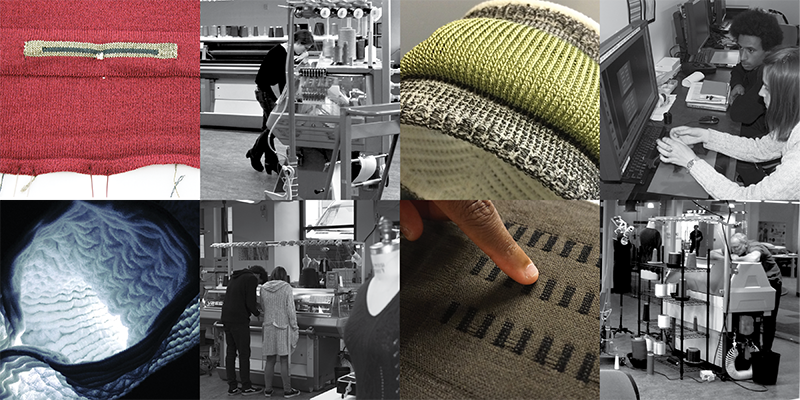
Drexel Knits New Layer of Advanced Manufacturing
The Drexel Center for Functional Fabrics, a regional hub for designing and prototyping smart fabrics, embodies the innovation, imagination, and legendary can-do spirit found in Pennsylvania. We toured the Center’s Shima Seiki Haute Technology Laboratory to learn how it creates fabrics that see, hear, sense, communicate, and even harvest energy.
The Rise of the Internet of Things (IoT)
With the rise of Internet of Things (IoT) technology, manufacturers across the nation are racing toward the goal of adding sensors and computing to any and all physical objects, including fabric. In 2016, a new national institute for advanced manufacturing of textiles was announced, and Advanced Functional Fabrics of America (AFFOA) was created. With the goal of creating American jobs and bringing smart fabrics into the 21st century IoT, AFFOA aims to incorporate research and academic expertise found in educational institutions across the nation to enable a domestic manufacturing-based fabric revolution.
Philadelphia’s Drexel University is one of those institutions –– and is now home to the first Fabric Discovery Center outside of Massachusetts. The center will work closely with industry partners and regional and state organizations including the Department of Community and Economic Development (DCED), the Ben Franklin Technology Partners and the Industrial Resource Centers to support the development of new products and manufacturing processes by established companies, start-ups and entrepreneurs in the functional fabric space.
Working with AFFOA to address the gaps in functional fabrics and facilitate product development, Drexel’s leadership in research, science, and design offer a unique advantage for AFFOA – especially with Drexel’s leadership in cost-sharing and convening contributions from partners throughout Pennsylvania, including DCED. But the innovation of fabrics had begun at Drexel long before the AFFOA announcement in 2016.
Genevieve Dion of the Westphal College of Media Arts & Design has been a leader in designing and developing amazing products based on “smart fabrics” for nearly a decade. Dion began research in the field of functional fabrics after a successful career in fashion design, with her work being sold at Bergdorf Goodman and Barneys in New York. After joining Drexel, she brought design research into the beginning stages of the scientific process and began exploring the potential of functional fabrics. In 2012, she launched the Shima Seiki Haute Technology Laboratory with an equipment donation from Shima Seiki — state-of the-art knitting machines that function like 3-D printers. The lab’s vision is to further explore the potential of functional fabrics — transforming textiles into interactive interfaces, then into textile devices that see, hear, sense, communicate, and even harvest energy.
Knitting the Future
To achieve this goal, Drexel brings together key players for a transdisciplinary, cross-college initiative. The Center for Functional Fabrics is part of Drexel’s Expressive and Creative Interaction Technologies (ExCITe) Center, dedicated to combining technology with creativity. This unique approach brings computer scientists, biotechnologists, material scientists, engineers, and fashion designers to the table to work on collaborative research and design projects.
Knitting is an ancient form of textile fabrication widely used in today’s textile industry. Combined with digital modeling and design, knit fabrication holds remarkable potential for smart fabrics where functional materials can be combined into a single piece of fabric. Knitting truly is a form of advanced manufacturing, and the machines in the Shima Seiki Haute Technology Lab provide the precision manufacturing and rapid prototyping capabilities to create small quantities or prototypes with these new materials. From there, companies can scale up the manufacturing process to bring it into full production across the apparel, health care, transportation, consumer electronics, and defense industries.
In addition to its partnership with companies, Drexel is developing several groundbreaking products with smart fabrics, such as a bellyband that monitors the well-being of a fetus, a touch-sensitive skin for robots, and a rehabilitative glove for hand therapy.
Rapid Prototyping for the Local Textile Industry
Drexel’s translational research in advanced manufacturing offers valuable resources to industry partners, startup companies, and small to mid-size manufacturers alike. Drexel’s Center for Functional Fabrics can provide technical expertise, joint research opportunities, and access to new technologies to companies interested in new approaches to textile manufacturing.
Specifically, Drexel offers consulting in design and rapid prototyping of functional fabric devices, materials characterization, and the ability to manufacture these materials, as well as research on new advanced fiber and digital fabrication, advanced textile manufacturing processes, and approaches that overcome the functional fabric manufacturing challenges.
By enabling companies to break into new markets, Drexel also plans to stimulate the regional economy, bringing manufacturing jobs back to Philadelphia and Pennsylvania. The program will seek to retrain those already in the textile industry for jobs in functional fabrics.
As this public-private partnership starts to revive the local manufacturing industry, Drexel will continue to move the industry to a place where it can make tech disappear by integrating it into the fabric we see, touch, and wear every day
Learn more about the Drexel Center for Functional Fabrics and the Shima Seiki Haute Technology Laboratory on its website, or follow Drexel University on Facebook, Twitter, Instagram, or YouTube. You can read other unique industry and university collaborations that are happening across the Keystone State at the DCED website.

Amy Zecha
In her role as Executive Director for Marketing at the Department of Community & Economic Development, Amy Zecha is responsible for sharing positive news about Pennsylvania. In addition, Amy is always looking for ways to promote the many programs and services offered by the department to communities, businesses, and citizens.
